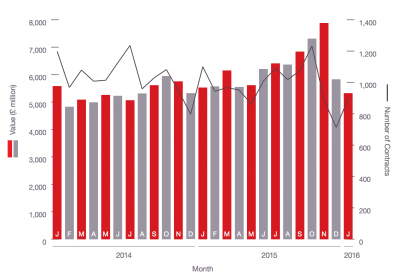
Barbour ABI has reported a slow start to the year for the construction sector, with contract values for January 2016 dipping to £5.3bn, a decrease of 9% when compared to the same month of 2015 and a more substantial reduction of 33% when compared to November 2015.
The latest Economic & Construction Market Review has shown that the residential sector led the construction industry with a total contract value of £1.4bn in January – a somewhat surprising figure considering residential contract values dipped by 36% when compared to the previous month, based on a three month rolling average.
Looking across other sectors within the industry, the appetite for new offices continues to attract investment as they dominated the commercial & retail sector with 80% of the total contract value worth just under £800m and greatly supported by the recently commissioned 22 Bishopsgate office scheme worth of £500m.
Regionally, Wales received a major economic boost, as the Hitachi led Wylfa power station in Anglesey was agreed in a £450m, a coup for the region and the infrastructure sector.
Commenting on the figures, Michael Dall, lead economist at Barbour ABI, said: “Whilst January was a relatively slow start for construction in terms of contract value, the industry pipeline is relatively strong and I’m expecting to see a flurry of £100m plus projects to get agreed over the coming months. I see private housing and infrastructure as the bright lights of the sector for 2016.
“However the industry does need to be wary of a growing trend of major contractors not being able to agree a final price with clients, largely due to cost inflation and skills shortages. It is an indication of the difficulties the industry could face in the future as demand seems to be holding strong but increasing costs could potentially affect the sector’s ability to deliver.”
The full report from Barbour ABI can be viewed here.



